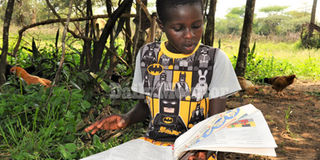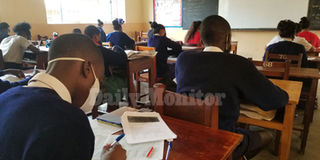Have candidates had enough time to prepare for final exams?

Dorcus Chepkopus reading through her self study materials in Ashiokanion Village, Kalita Sub County, Amudat District in August 2020. Many children in rural areas faced learning challenges during school closure. PHOTO/PAUL MURUNGI.
What you need to know:
- With all three groups of finalists about five months short of the traditional school schedule, how prepared are they ahead of the final examination dates?
Traditionally, the academic year has lasted a year from January to December. The spell caters for primary and secondary students with Primary Leaving Examinations (PLE), Uganda Certificate of Education (UCE) and Uganda Advanced Certificate of Education (UACE) examinations coming at the climax of Primary Seven, Senior Four and Senior Six respectively. The year is divided into three terms to cater for holidays.
During the students’ first term in March last year, the Covid-19 pandemic struck, forcing closure of schools. Seven months later in October, some students were back in class (P.7, S.4, and S.6). There were questions of when they were to do their finals after all it was a month away from the time of the year when the success cards are sent to different schools.
That question was answered last week on Friday when the Ministry of Education and Sports announced official examination timetables for the 2020 PLE, UCE and UACE. The primary education finalists will write their finals on March 30 and March 31, meaning they ought to have covered the primary syllabus in five months instead of the traditional 12.
The O level finals start on March 1 and finish on April 6. They too will have used five months instead of 12 and the same applies for the A level finalists. With all three groups doing their finals about five months short of the traditional schedule, how prepared will both teachers and students be for the new dates?
Mr Joseph Bwete Kanyike is a mathematics teacher at both St. Maria Goretti Katende and St Lawrence Schools and Colleges. He has handled candidates for over a decade and feels that the current lot face an uphill task. “They will not be prepared,” he boldly told Daily Monitor. “But there is nothing to do as current circumstances have pushed us all here,” he adds. As a teacher, he talks to his students on a regular basis and can sense how raw and worried they are. “Psychologically, you can sense they are far from ready but we are doing everything within our means to give them confidence,” he promises.
Poor preparations for final exams can spell disaster. It is a worry that surrounds teachers, students and parents. A five months deficit of class time has never been experienced before and a lot of uncertainty awaits candidates. How will they perform or overcome with the odds stacked against them? Kanyike thinks it’s up to Uganda National Examination Board (UNEB) to have a hand in the performance. “It is hard to predict the performance. There is a role of teaching played by the teachers and the one of assessment played by examiners,” he says. Once the teaching is done, students’ fate lies in the examiners’ hands.”UNEB can decide to relax the grades by being lenient in marking.

Students of Greenhill Academy in class during the Covid-19 pandemic outbreak. PHOTO/FILE/DESIRE MBABALI.
The quality or difficulty level of the exam is another way UNEB can cater for students who have not had full coverage of the syllabus,” opines Kanyike who also happens to be an examiner.
While the situation looks bearable for those in well off schools, it’s a mystery for schools in rural areas. Ngando, Butambala in Mpigi District, 100km from the city centre, is home to many Universal Primary Education schools in dire condition. Wamala Foundation Primary School is one of them.
By press time, the administration was not even aware of the new official PLE dates announced by the ministry. “Oh it’s March 30 and 31!” exclaimed Ritah Nambalirwa, a teacher at the school, on hearing the news from a reporter of this paper. She asked whether the news was credible before lamenting, I even don’t know what to expect from these children deep down here in the villages. These ones have more than enough problems let alone education,” she said.
Nambalirwa claims only a few of her Primary Seven students returned in October. They face all sorts of problems including lack of meals, walking long distances, poor infrastructure to lack of stationery among others. “Our students here are at God’s mercy. They have studied for a short time, they take long to grasp things and most of them are overage. They have other things to do outside education which makes it impossible to get their full attention,” she revealed.
Amid the concerns, there is hope the candidates can come through the finals unscathed. “It has not been the usual teaching rather than revision and sitting past papers,” said Kitaka Monica, a social studies teacher at Ebenezer Primary School, Kisugu. She is positive that good revision and not focusing on finishing the entire syllabus can help students pass. “It does not help to pump them with notes with little time to revise them. Pick a few topics and focus on them to prepare them,” she added.
By the time the next academic year starts in July, UNEB should have released PLE, UCE and UACE results. For now, the jury is out on the candidates come the finals.
Stumbling blocks
Mr Joseph Bwete Kanyike is a teacher of Mathematics at both St. Maria Goretti Katende and St Lawrence Schools and Colleges. He has handled candidates for over a decade and feels that the current lot face an uphill task. Poor preparations for final exams can spell disaster.
It is a worry that surrounds teachers, students and parents. A five months’ deficit of class time has never been experienced before and a lot of uncertainty awaits candidates. How will they perform or overcome with the odds stacked against them? Kanyike thinks it’s up to Uganda National Examination Board (UNEB) to have a hand in the performance. “It is hard to predict the performance.
[email protected]




